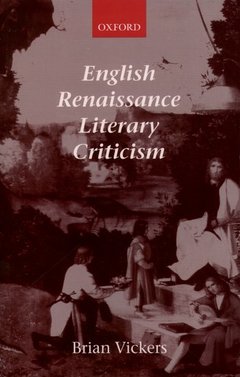Description
English Renaissance Literary Criticism
Author: Vickers Brian
Language: English
English renaissance literary criticism
Publication date: 02-2003
672 p. · 20.2x21.6 cm · Paperback
Publication date: 02-2003
672 p. · 20.2x21.6 cm · Paperback
English renaissance literary criticism
Publication date: 01-2000
672 p. · 14.8x22.4 cm · Paperback
Publication date: 01-2000
672 p. · 14.8x22.4 cm · Paperback
Description
/li>Contents
/li>Biography
/li>Comment
/li>
This is the first comprehensive collection of English Renaissance literary criticism to appear for nearly a century. Brian Vickers has brought together a wide-ranging selection of texts, some well-known (such as Sir Philip Sidney's Apology for Poetry, the most brilliant critical essay of the whole Renaissance, here given complete), some little-known (Dudley North's account of Metaphysical poetry), and one being printed for the first time (John Ford's elegy on John Fletcher). In an extensive introduction the editor surveys the main sources and models for English criticism, which turn out to be the major classical texts fusing poetics and rhetoric: Cicero, Quintilian, Horace, Plutarch. Whereas modern literary theory conceives of an autonomous poetic (the poem existing as a verbal artefact, irrespective of its influence on the reader) in the Renaissance all critical theories were rhetorical, seeing literature as having a deliberate design on its readers, to arouse their feelings and to make them love virtue, hate vice. Writers commonly saw their task as being to 'inflame' readers with the desire to emulate goodness. Renaissance literary criticism is also prescriptive, not descriptive: that is, it describes how literature should be written and what effects it should strive for. Accepting this orientation, the editor has included a substantial selection from the major hand-books on rhetoric and poetics, Thomas Wilson's The Arte of Rhetorique (1560) and George Puttenham's The Arte of English Poesie (1589). The emphasis throughout is on the links between literary criticism and literature itself. Most of the selections were produced by the practitioners themselves, poets and dramatists discussing their art: Gascoigne, Spenser, Campion, Daniel, Jonson, Shakespeare (in one of the scenes he contributed to Edward III), Chapman, Fletcher, Heywood, Massinger, Milton. The anthology also includes discussions of all the major literary genres: Senecan tragedy, comedy, tragicomedy, pastoral and allegory, Homeric translations, epic and romance, religious and lyric poetry. All selections are annotated, identifying classical and other sources, and giving translations for Greek, Latin, and Italian texts. A section is devoted to Further Reading, and an extensive glossary is provided for archaic and technical words.
Preface, Abbreviations, Introduction, Further Reading, A Note on the Texts, 1: Sir Thomas Elyot, 2: Henry Howard, 3: Thomas Wilson, 4: Alexander Neville, 5: William Baldwin, 6: Roger Ascham, 7: George Gascoigne, 8: George Whetstone, 9: Edmund Spenser and E.K., 10: George Puttenham, 11: Edmund Spenser, 12: Sir John Harrington, 13: William Shakespeare, 14: Gabriel Harvey, 15: Sir Philip Sidney, 16: George Chapman, 17: Robert Southwell, 18: John Hoskyns, 19: Thomas Campion, 20: Samuel Daniel, 21: Ben Jonson, Rhymes against rhyme, 22: Francis Bacon, 23: Ben Jonson, The moral function of poetry, 24: Thomas Heywood, 25: John Fletcher, 26: Dudley North, 27: George Chapman, 28: Ben Jonson, The faults of contemporary drama, 29: William Drummond, 30: Ben Jonson, A tribute to Shakespeare, 31: John Ford, 32: Philip Massinger, 33: Thomas Carew, 34: Ben Jonson, Notes on literature, 35: John Milton, 36: Thomas Hobbes, Glossary, List of Rhetorical Figures, Index
Brian Vickers is Chair of English Language and Literature, ETH Zürich.
© 2024 LAVOISIER S.A.S.




